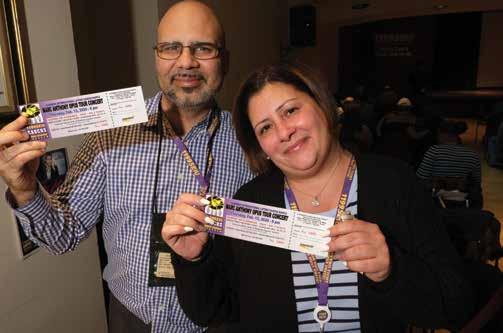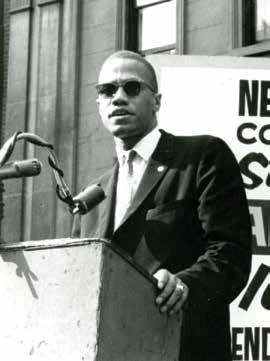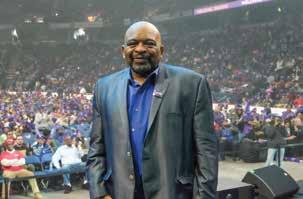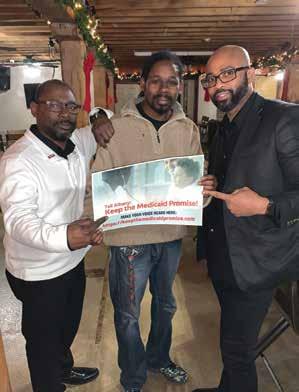
13 minute read
Gun Stories
from 1199 Magazine
by 1199SEIU
Members share their experiences with gun violence and the ways they are fighting back and healing.
Every day, local and national news outlets churn out stories about guns and gun violence across America. From big cities like Chicago and New York, to small towns in the Midwest and Southeast, there is no corner of the nation untouched by gun violence and the debate around gun rights. According to the Giffords Law Center, 100 Americans are killed with guns every day and over 1.2 million people have been shot in the last decade.
Advertisement
United States gun culture and related legislation are a patchwork quilt of stringencies, ranging from deep background checks to open carry laws. High-profile mass shootings and the vocal movement to address police shootings in our Black and Brown communities have prompted
national debates about regulation, systemic racism, and street violence. 1199 has consistently been at the forefront of the movements calling for safer communities, an end to police violence, and common-sense gun laws that respect the rights of law-abiding firearm owners.
In the U.S., gun ownership is rooted in the Second Amendment, but even the U.S. Supreme Court has upheld some limitations, including certain bans on concealed weapons and the sale of firearms to specific groups of people. Still, gun rights and gun ownership are a central facet of America’s national identity. Though most Americans support stricter gun laws, legislation banning certain types of weapons has been consistently scuttled, and the debate rages on in state houses and capitals across the country.
Generally speaking, gun stories follow the news cycle. After a tragedy, we’re inundated with heartbreaking victim profiles, calls for systemic change, and reports of loss and trauma.
But for many, including many 1199 members, these experiences are part of their daily landscape. Too many of us live in weary, neglected communities. Muted by the debate around rights and policy are the stories of everyday working people who endure shocking loss while caring for loved ones and advocating for change. 1199 Magazine asked some of our members to share with us how guns and gun violence have affected their lives. These are some of their stories.
Caregiver, Healer, Mother
Robert Kirkham Photo
Dorinda MacDougald considers herself lucky. Her son Kevin was 25 when he was shot in the hip in an East Buffalo drive-by. Discharged to his family’s care, the six-foot-tall-and-250-pound young man needed around-theclock care by MacDougald and her daughters. Kevin eventually walked again, thanks in no small part to his caregiver mother’s experience and determination. His friend, wounded in the same shooting, was shot in the neck and paralyzed. MacDougald says it was hard watching Kevin struggle with the trauma and aftermath. “You know they just don’t want to go to therapy. He wanted to tough it out, even though he was reliving it day after day,” she says. The experience turned her into an activist. “We have meetings where I talk to people. I go speak with young people. I tell them they have to stop this stupid ‘no snitching’ where the community doesn’t tell the police after a crime,” she says. “I understand because the community doesn’t trust the police,” she continues. “Our 1199 Political Action Fund is a big part of making change here. I have started meeting with politicians and helped re-educate police officers about how to treat people. I’ve helped set up meet-and-greets where officers can get a chance to meet with the community and listen.”
“I Just Want To Know if He
Called Out for His Momma.”
Catherine Jefferson picked her son’s body up from the morgue on Dec. 23, 2019. It would have been his 38th birthday. Jefferson has been a CNA at Vista Manor in Titusville, FL for 23 years. And recently the hard work caught up with her, putting her out on disability. At the same time, her son Eric was released from prison, after serving time on drug charges. Eric was living in a halfway house when he got permission to stay with Jefferson and help take care of her. On Dec. 18, Eric headed out for a doctor’s appointment. A few hours later the police were at Jefferson’s door, telling her that her son’s body had been found with a gunshot wound to the head. “I called his dad, who lives in Atlanta, and told him and then I just started walking down the road. Just walking and walking. I collapsed, and my other son found me.” Jefferson says her son was a
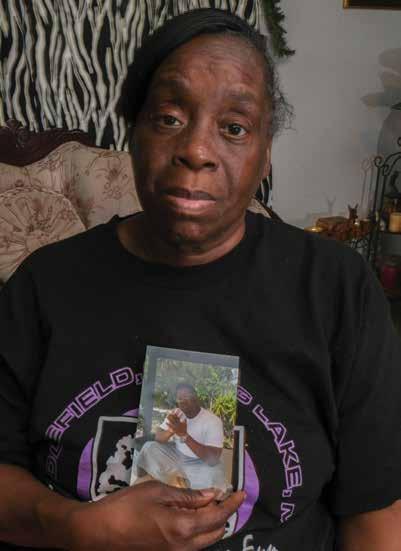
good guy who would go out of his way to help friends and strangers alike. “He had been selling drugs, but he turned his life around. He was working one job and trying to get a second one. He wanted to be there for his kids. He wanted to get his life together for them,” she says. Some days, Jefferson just sits in Eric’s room, wondering how it all happened. She thinks old associates lured her sond to his death. “I just want to know if he called out for his momma,” she says, taking a long pause. Gathering herself, Jefferson sounds resolute in her promise to help other mothers and ensure they never have to know her pain. “We need to talk more about how we are losing our kids. There is so much senseless killing of our children. I know some families are scared to speak out because of retribution, but if we keep hiding this killing of our sons and daughters is just going to go on and on. We need to stand up for them because this needs to stop.”
GUN STORIES
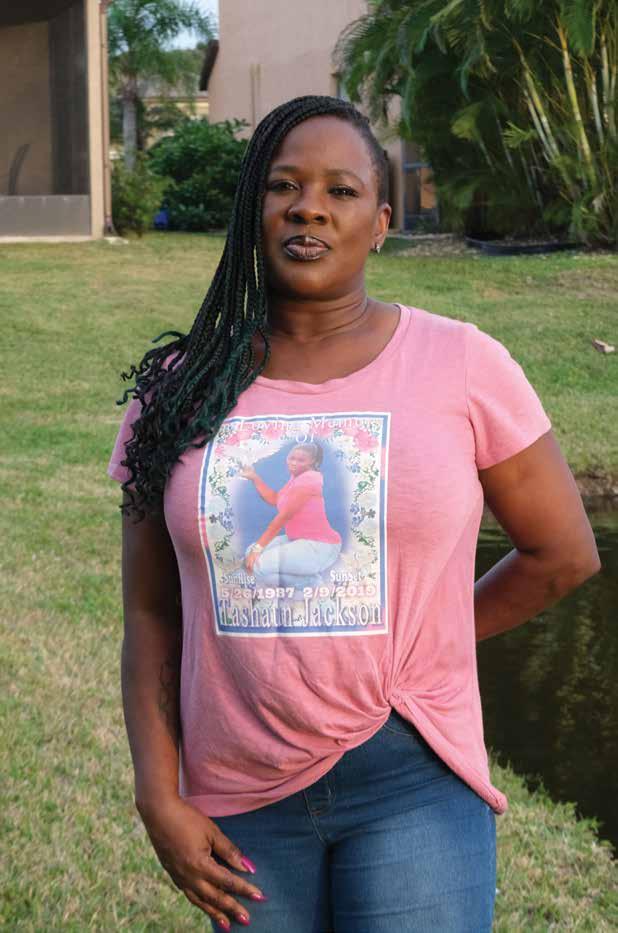
“There Wasn’t Enough Time To Scream”
“I absolutely disagree with having [guns] in homes. I don’t want them anywhere around me. I have seen what can happen when there is a gun around in the middle of a conflict,” says Angelette Harley, a cook at Titusville Rehab in Titusville, FL. Harley has endured the murder of several family members. She was a witness to a shooting at a restaurant she managed, where a long-running dispute between two co-workers took a deadly turn. “He walked in and shot [her]. It was like time stopped. You see the gun. You see her. You see the person with the gun. Your brain is going ‘this isn’t going to happen.’ There’s almost not enough time to process everything that’s going on. People asked me why I didn’t scream, but there wasn’t enough time to scream.” Harley says she went right into “manager mode,” protecting customers and warning nearby establishments about what occurred. “Your adrenaline doesn’t stop in a moment. It took me years to understand what happened,” she says. Harley eventually had to testify against the shooter, who is now on Florida’s death row. Harley’s strong faith has helped her find compassion for the victim and the shooter. “So often you see people like this, who are not getting any kind of help. They’re not getting any kind of medication. [The state] knows they are out there and then when this happens, they throw them onto death row. So many lives are wasted.”
The Healing Power of Music
Nathan Leuking, is a Licensed Clinical Social Worker with Washington, D.C.’s Department of Behavioral Health School Mental Health Division, at Anacostia High School. Leuking introduced a groundbreaking music therapy program at the school to help kids deal with trauma, including gun violence. “I developed a music therapy program that uses a psychodynamic therapy and audio recording that allows students to access rap, singing, or spoken word to express themselves as opposed to traditional talk therapy.” Students who participate in the program, which attracts mostly boys and a not-insignificant number of LGBTQ kids, have an hour of traditional therapy every week and then work with Leuking on their rap compositions. Leuking is a musician and knows the healing power of music and the creative process. Kids make their own, original rap and spoken word recordings

using a studio Leuking initially put together using his own equipment. (Since its inception, the program has received funding for expansion to several other schools.) “You just need a computer, a microphone, some space and not much else,” says Leuking. He’s seen first-hand the program’s benefits; kids gain access to feelings they might not have had words for. “It’s traditional that if you lose someone, you come in and do a song for them. We have some of the toughest guys in the school in the program. Talk therapy can be very limiting and not appealing to high school students. They’re a lot more excited to do rap or music or something that is fun and more socially acceptable. It gives them a permission structure to process some very deep stuff. If you listen to rap, the lyrics are often about some pretty heavy-duty stuff. Kids might not be able to talk about trauma around their friends, but if they rap about it and play it for their friends suddenly, they’re seen as cool. It’s a bridge to acceptance.” “Organizations Like 1199 Can Play a Big Role in Changing Things”

Keith Jenkins, a CNA at Caring Family Rehab in Far Rockaway, NY, says he grew up in a stable, loving family, but the streets were hard to resist. “I saw a lot growing up, but the one that got me was when my cousin was killed in a dice game. I never expected it,” says Jenkins. When his son was born in 1996, Jenkins decided to give up the street in favor of fatherhood. “I vowed that my son would not be a product of his environment. I vowed that I would be in his life 24/7.” Jenkins, who was 19 when he first became a father, says that parents have to take their roles seriously and not worry about being overbearing. “Fathers in particular need to be involved 1000%, and I promise you that if we had more of that in every family, we would have less gun violence.” Jenkins is 43 now, and the father of two sons and three daughters; he’s a Member Political Organizer (MPO) working in Long Island. “I think organizations like 1199 can play a big role in changing things. Look at how many members we have. If we can put these messages out there about change and what’s possible in our communities, just think what we can do.” Gun Safety, Not Gun Restrictions
Dimitri Dauphin is a cook’s aide at Northwell Plainview and an MPO working on Long Island. To put distance between him and the gang violence in his native North Miami, his mother sent him to New York when he was a teenager. “Growing up in Florida, guns were always looked at [as normal]. We went hunting. Guns were a normal thing to have. I see them in a different light now,” he says. Dauphin was deeply affected by murder of his best friend in a drive-by shooting at the age of 16. “I remember feeling the need for revenge,” he says, adding that he considers himself lucky to be alive. “I’m a relic back home,” he says. Despite his experience, Dauphin believes that lawabiding citizens have a right to own a gun, and the standard debate around gun legislation is often misguided. “Criminals don’t buy guns from gun stores. They buy them on street corners and from the back of trucks,” he points out. “People often carry guns because there are other people with guns who want to shoot them.” Dauphin supports background checks, but balks at laws limiting the availability of firearms to law-abiding citizens. “As far as restricting calibers and kind of guns, I think it’s nonsense. Yes. It’s true that a lot of the wrong people are getting guns, but that should not stop regular, everyday citizens who feel the need to protect themselves from getting a gun if they want one.”
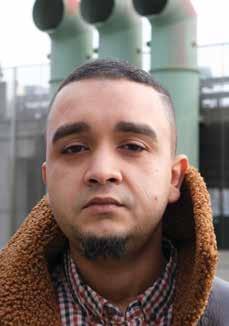
Make sure your tax refund is all it can be with the Earned Income Tax Credit It’s Tax Time!
1199SEIU and the National Benefit Fund are again making available a free tax prep program for members, so they can pay only the taxes they owe and apply for the Earned Income Tax Credit (EITC). The EITC is a tax refund for lowto-moderate income families. Since its inception in 1999, the program has helped members in NYC alone file for $100 million dollars in tax refunds. The program works with professional tax preparers to help members prepare their taxes and is free of charge. Below is what you’ll need to file for the EITC and site locations, dates and times. Call the listed numbers for more information.

WHAT YOU NEED TO BRING TO FILE FOR THE EITC: • Your spouse. If you are filing a joint return, your spouse must be present. • Government-issued photo ID • Social Security card • All applicable forms from 2019, including
W-2, 1099, 1098-T, 1095-A, 1095-B/1095-C,1098 and 1098-E. • Tax Employer Identification Number and SSN of your child care provider if you are claiming child care expenses • Sample check with routing number if you’d like direct deposit of your refund • Amounts of any other income such as jury fees or gambling winnings • A copy of last year’s tax returns
SITE LOCATIONS:
Florida Call Volunteer Income Tax Assistance (VITA) to locate sites near you. If you can’t find a convenient site near you, there are additional Volunteer Income Tax Assistance (VITA) sites that offer free tax preparation. Just call the VITA Site Locator Hotline at (800) 906- 9887 or use the VITA Site Locator Tool at www.IRS.gov/Individuals/ Find-a-Location-for-Free-TaxPrep to locate your nearest VITA site and find hours of operation and contact numbers.
Maryland Baltimore January 28 - April 15 611 North Eutaw Street Tuesday to Thursday: 10 a.m. to 5 p.m. Friday and Saturday: 9 a.m. to 3 p.m. Sunday and Monday: Closed *No walk-ins or drop offs. Call (443) 449-2019 to make an appointment. Massachusetts January 29 - April 15 Springfield 1199SEIU Office 20 Maple Street Mondays: 9 a.m. to 12 p.m. Fridays: 9 a.m. to 5 p.m. Saturdays: 9 a.m. to 4 p.m. Quincy 1199SEIU Office 108 Myrtle Street, First Fl. Wednesdays: 4 p.m. to 8 p.m. Thursdays: 4 p.m. to 8 p.m. Fridays: 4 p.m. to 8 p.m. Saturdays: 9 a.m. to 4 p.m. Call (617) 284-1188 to make an appointment.
Upstate New York Buffalo January 27 - April 15 2421 Main Street, Suite 100 Monday to Thursday: 4 p.m. to 8 p.m. Saturdays: 10 a.m. to 2 p.m. Call (716) 982-0540 to make an appointment. Carthage March 7 9 a.m. to 5 p.m. Carthage Area Hospital Call (315) 287-9013, ext. 11 to make an appointment. Gouverneur February 1 - April 4 93 E. Main Street Monday and Thursday: 5 p.m. to 8 p.m. Saturday: 10 a.m. to 2 p.m. Call (315) 287-9013, ext. 11 to make an appointment. Plattsburgh February 14 -16 Champlain Valley Physicians Hospital, 1199SEIU Office Call (315) 287-9013, ext. 11 to make an appointment. Rochester January 28 - April 15 1199SEIU Office 259 Monroe Ave, Suite 220 Tuesdays and Thursdays: 4 p.m. to 8 p.m. Saturdays: 9 a.m. to 3 p.m. *Please note that the first Tuesday at this location is March 3rd. Strong Memorial Hospital 601 Elmwood Ave. February 4 - 25 Tuesdays in February: 4 p.m. to 8 p.m. Call (585) 730-6433 to make an appointment. Syracuse January 27 - April 15 250 S. Clinton St. Monday - Thursday: 5:30 p.m. to 9 p.m. Saturdays: 9 a.m. to 2 p.m. Call (315) 295-1822 to make an appointment.
Downstate New York and New Jersey Members in New Jersey and downstate New York, including New York City, Westchester County and Long Island can go to www.1199SEIUBenefits.org/ EITC for information about EITC tax free preparation site locations, their hours of operation, and contact information. Other resources and information are available on the NBF website.


